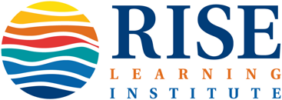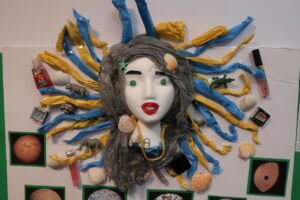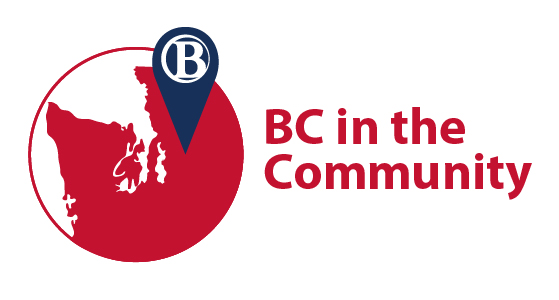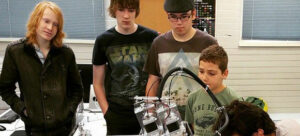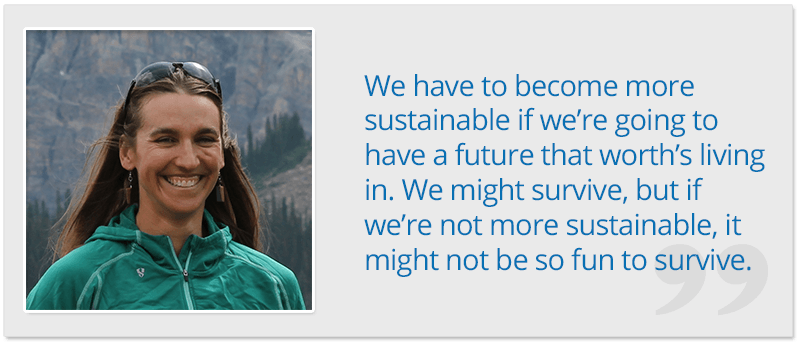
For Sonya, it is through innovation that students can walk away from a course not just having received a grade, but having truly understood the material. She finds that the best way to achieve this is though experiential opportunities, particularly field-based education and service-learning. In her 3.5 years at Bellevue College as a Chemistry and Environmental Science professor, she has worked hard to pair her love of service and community engagement with her passion for sustainability. In partnership with Dr. Rick Glover, she helped to develop the Undergraduate Research in Chemistry course, which connects students with real-world issues through community engagement and experiential learning. She also started the new Sustainability Concentration, an interdisciplinary program focused on giving students the knowledge and tools needed to benefit the community and the environment. Sonya justifies her passion for sustainability simply yet powerfully: “We have to become more sustainable if we’re going to have a future that worth’s living in. We might survive, but if we’re not more sustainable, it might not be so fun to survive.”
When she started college, Sonya never imagined that she would end up as a Chemistry professor working on environmental sustainability. A field-based learning opportunity, working with a chemical ecologist on the decimation of local oak trees by gypsy moths, pulled her away from her planned History major. She loved the utilization of science “to help solve a problem.” In essence, experiential learning in a completely different field started her down the path to recognizing the importance of community engagement and field-based learning.
The second most transformational moment came when she was asked to co-teach a course with a cultural anthropologist, who caused Sonya to question her own beliefs about the universality and objectivity of science. She learned that interpretations of science were “influenced by the context in which you’re doing it, the culture, the time, everything.” She walked away with a broader perspective, and more importantly, she came to realize the benefits of interdisciplinary collaboration and partnerships. Both these experiences guided her down the road towards service-learning.
Sonya completed her M.S. and Ph.D. in Oceanography at the University of Washington, conducting research on carbon cycling in the Brazilian Amazon. After receiving her Ph.D., she performed Post-Doctoral research on eutrophication in Tacoma, Washington, working closely with the local community. Prior to Bellevue College, Sonya was a post-doctoral teaching in the Program on the Environment at the University of Washington (2008-2010) and faculty in the School of Sustainability at Arizona State University (2010-2013) where she remains a Sustainability Scientist.
It was during her time at UW and ASU that Sonya started to engage with the community in order to enhance her students’ education. While at the University of Washington, she assisted North Seattle Community College with its Atoms to Ecosystems course, which involved community-based research and field opportunities for its students. Sonya recalls one student, the first of her family to go to college, being uncertain about whether to even take a single course. Now the student has a Master’s degree in Soil Science, simply because of how she was able to connect the academic material to the real world of climate change. According to Sonya, the student “got so into what she was doing, it was just amazing to see her transform.” Seeing the changes in the student’s confidence and sense of empowerment stays with Sonya to this day.
Sonya utilized service-learning in Arizona to make sustainability issues real for her students while also supporting a marginalized community. Her interdisciplinary course partnered with an “urban center where [some marginalized] women could go and…get the support they needed to…continue going to school.” Since this center wanted to be as self-sufficient as possible, they welcomed the idea of Sonya’s students working on a permaculture garden for them. As the science students in the class were busy analyzing the soil and planning the garden, one of Sonya’s social science students demonstrated the importance of multi-disciplinary collaboration by causing them to rethink their plans. “She went around and did surveys at different households trying to figure out what kind of food they would use. If we grew it, would they use [it]?” By going directly to the women staying the center, the project pivoted away from what the students wanted to what the community needed, thus leading to a more meaningful service-learning experience for everyone.
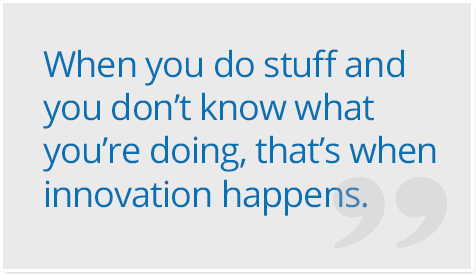
Sonya hopes to bring the lessons from these two programs, as well as from her own experiences, to the students of Bellevue College. She wants her students to learn not only from their books, but also from those with practical knowledge. Students should feel empowered to make a difference. “Civic engagement and service-learning…help students get a better feel for the problems in the world and also help them feel like they can solve the problems.” There is a mandatory 15-hour minimum service-learning project as part of the Sustainability Concentration. Sonya has joined 16 other BC instructors to form the first cohort of the service-learning Faculty Learning Community, a yearlong program co-sponsored by the RISE Learning Institute and the Faculty Commons. This collaborative effort will help Sonya innovate in the classroom to both enhance the learning of her students and serve the community and the environment.
After mulling over the question posed earlier about innovation, Sonya chuckled as she came upon the most eloquent of answers. “When you do stuff and you don’t know what you’re doing, that’s when innovation happens.” For Dr. Sonya Doucette, though, she knows what she’s doing and how best to make a change in the world. Community service, civic engagement, sustainability, innovation, and of course, student growth, are all passions that she has brought and will continue to bring to Chemistry and Environmental Science, and to Bellevue College as a whole.
Last Updated January 5, 2021
